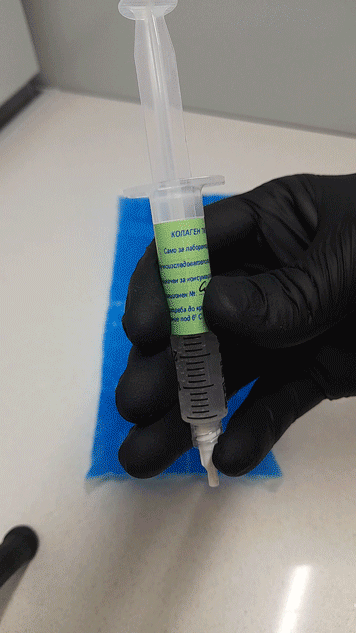Collagen type I
Collagen is the most abundant protein in mammals, accounting for approximately one-third of the total protein in the human body. In fact, collagen is a superfamily of proteins consisting of at least 46 types of polypeptide chains that make up the 28 types of collagen molecules known thus far in vertebrates. Collagens are found in tissues such as skin, bone, ligaments, tendons, cartilage and the cornea. All collagens exhibit a unifying feature that classifies molecules as belonging to the collagen family, namely a repeating Gly-X-Y motif (wherein Gly is glycine while X and Y may be any amino acid, but most frequent are proline and 4-hydroxyproline, respectively). Collagens mostly have a structural function but they are also responsible for conveying critical biochemical cues to cells. At a cellular level, functions such as cell adhesion, migration, metabolism, and proliferation are all regulated by cues provided by collagen. It has been widely explored to repair the human body, e.g. for wound healing.
MatriChem’s collagen is bovine Achilles tendon-derived type I collagen. MatriChem ensures consistent collagen properties by sourcing the tendons from cattle with controlled age, breed, sex, diet, and amount of exercise. This is enabled by the fact that MatriChem operates the first laboratory certified by the Bulgarian Food Safety Agency (BFSA) to process animal byproducts for research purposes, specifically, for the extraction of collagen and other extracellular matrix (ECM) biomolecules.
The purity of MatriChem’s collagen type I has been ascertained by Coomassie-stained SDS-PAGE, differential scanning calorimetry, and Biuret protein assay. Furthermore, based on turbidity measurements, its solubility in acetic acid has been established to be comparable to or even better than commercially available bovine collagen type I.
Sodium-dodecyl sulfate polyacrylamide gel electrophoresis (SDS PAGE) analysis of MatriChem’s collagen (right track) reveals characteristic bands for high purity collagen type I with respect to the molecular weight standard (left track) and commercial collagen type I (not shown).
Differential scanning calorimetry results are indicative of a high purity product with narrow and well defined denaturation temperature.
We have established the kinetics of the collagen fibrillogenesis, monitored at various temperature ramp rates, to be the most sensitive indicator of the quality of the collagen batch. During our development of the extraction procedure, qualitatively different gelation kinetics were observed for collagen batches which demonstrated no other significant differences in the monitored properties.
Typical gelation kinetics of MatriChem’s collagen solution at 37°C as observed by a rheological investigation.
We have developed a collagen bioink formulation suitable for extrusion bioprinting. The formulation is insensitive to a temperature as high as 20°C within the typical duration of a bioprinting process. This makes it suitable for use with a cooled bioprinting head in the absence of a temperature-controlled head. The bioink is thermally crosslinked at carefully selected bed temperature.
Place your order today!
You can order any of our products by filling in the form below. Standard lead time is between 2 weeks and 2 months.






